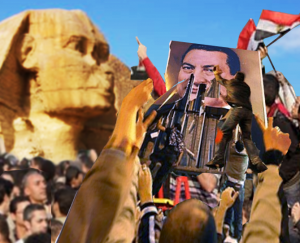 By Ursula Lindsey, Chronicle of Higher Education
By Ursula Lindsey, Chronicle of Higher Education
Cairo
Archaeologists inside and outside Egypt are anxiously monitoring the fate of the country’s antiquities, after several museums and archaeological sites were looted following the pervasive protests and security vacuum that have gripped the country. Demonstrators here have taken to the streets for the last six days, calling for an end to President Hosni Mubarak’s 30-year authoritarian rule.
The turmoil is also affecting research projects.
Some future archaeological missions to Egypt have been canceled, and some foreign teams here are leaving. But others are staying put.
After tens of thousands of protesters took control of Cairo’s central Tahrir Square last Friday evening, and the police abandoned the streets, a crowd of 1,000 people broke into the gardens in front of the Egyptian Museum, which is home to some of the country’s most precious Pharaonic antiquities, including the famous Tutankhamen trove.
Looters ransacked the museum’s gift shop, making off with souvenirs and gold jewelry. Citizens and museum officials locked arms and guarded the building until army forces arrived.
But a group of men climbed the museum’s fire escapes and entered galleries on the top floors. They were apprehended by tourist police inside the museum.
“They were looking for gold, and they thought there were golden statues in the museum that they can sell in the market,” the museum’s director, Tarek El Awady, told The Chronicle. “They grabbed gold-plated statues, but when they realized they were actually wood, they threw them on the floor.”
“Only 13 showcases—out of hundreds—were damaged,” said Mr. El Awady. “Seventy-five artifacts were moved or damaged, but I think none are missing. Our conservators will work on restoring these artifacts once the situation calms down.”
Mr. El Awady said small groups of looters have continued to attempt to scale the museum’s walls and break in, but they have been apprehended each time by the army units now guarding the building.
The situation is more difficult at some of Egypt’s many far-flung Pharaonic excavation sites, many of which are located in the desert. Storage magazines near the Pharaonic sites of Saqqara—home to a world-famous stepped pyramid—and Abusir—another famous necropolis—have reportedly been looted. The Imhotep museum in Saqqara was also attacked by looters, apparently unsuccessfully.
Some of the artifacts in the looted storage facilities haven’t even been studied yet, said Salima Ikram, a professor of Egyptology at the American University in Cairo. “It is obviously, as with all antiquities, quite a tragic loss,” she said. Ms. Ikram hoped that most of the artifacts might be recovered. “Art dealers and museums should be aware that anything that comes from Egypt is very suspect,” she noted.
Research Suspended
There are over 200 foreign archaeological missions working in Egypt this year—ranging from two to 10 people each. There are also more than 2,000 foreign Egyptologists living in Egypt, many of whom are now evaluating their positions.
A foreign archaeologist working on a tomb excavation in the southern city of Luxor said a Belgian, Spanish, and American mission had left town, but her team felt “secure enough that we can stay.”(The archaeologist preferred to remain anonymous, saying, “I don’t want to act as a spokesperson for the Egyptian antiquities ministry.”)
“The situation here is pretty stable,” said the archaeologist, referring to the West Bank of the Nile in Luxor, where she works. “We don’t know what’s going on in the East Bank.”
The East Bank is home to most of Luxor city —where protesters set the local police station on fire—and to the temples of Karnak and Luxor, two of Egypt’s most famous tourist attractions.
The Associated Press reported that on Luxor’s East Bank, locals fought off a gang of robbers who tried to break in to the warehouse of the Karnak Temple.
At many sites, antiquities officials, excavation teams, and nearby residents have banded together to re-enforce security.
Mr. Al Awady, director of the Egyptian Museum, said what mattered was that “Egypt’s archaeological heritage has not been affected badly by this political situation. One of the most important things is to keep this heritage for coming generations. We want people to help because we don’t have enough resources to protect the sites and museums ourselves.”
The army has now deployed to protect all of the country’s national museums.